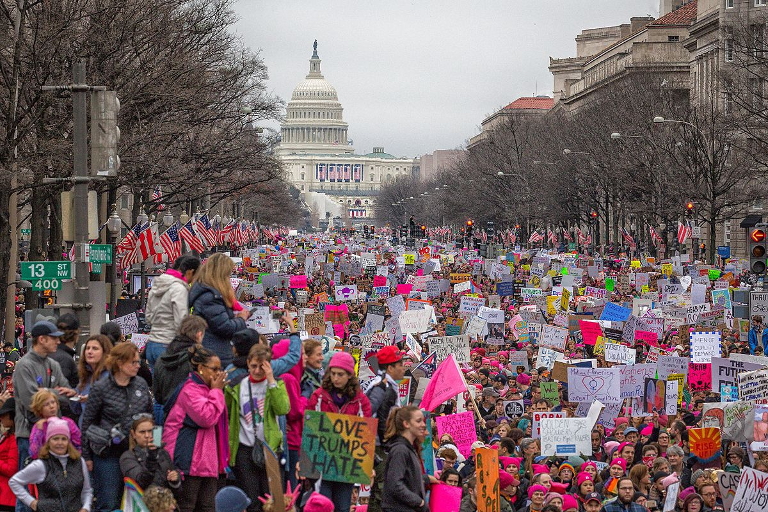In the year since Trump’s inauguration, we have seen an outpouring of popular mobilization in resistance to his administration’s policies. Crowd estimates suggest that 5.2-9 million people took to the streets in the United States to protest Trump’s policies or points of view over the past year. Many more have mobilized worldwide in reaction to the rise of right-wing populist movements across the globe, using people power to contest entrenched authority and confront oppressive regimes and systems.
Women have been at the forefront of these efforts. The 2017 Women’s March on Washington — whose Sister Marches spanned all 50 states and dozens of other countries — was likely the biggest single-day demonstration in recorded U.S. history. The momentum continued in 2018, with between 1,856,683 and 2,637,214 people marching in Women’s Marches this year. And women continue to be at the helm of movements like Black Lives Matter, the struggle for immigrant rights and the Fight for $15. Around the world, they have played vital roles in demanding reproductive justice in Poland, protesting repressive religious laws in Iran and asserting their right to political representation in Kenya.
While these outpourings of popular protest often look spontaneous, behind the scenes are an ever-evolving series of trainings, funding decisions and tactical innovations, often led by full-time organizers and activists. Successful campaigns of nonviolent resistance do not materialize over night, nor do they remain reactionary or improvisational. Instead, a tremendous amount of work goes on to ensure that such movements coalesce, maintain nonviolent discipline under repressive conditions and develop real staying power. Bringing millions of people to the streets is not an easy task, but maintaining momentum is even more difficult. It requires resources, organization, training, and time and space to build consensus around planning for the future.
At the same time as this dramatic rise in the use of nonviolent civil resistance around the world, dozens of organizations have developed to spread knowledge about the theory and practice of nonviolent action. Selina Gallo-Cruz points out the emergence of dozens of nonviolent conflict-oriented international non-governmental organizations over the past several decades, and the ways in which they may have helped diffuse knowledge and capacity about effective strategies for civil resistance. These include the late Gene Sharp’s Albert Einstein Institution, the International Center on Nonviolent Conflict, Momentum, Rhize, the James Lawson Institute, Training for Change, and various other organizations.
In recognition of the unique challenges and opportunities women-identified activists face in training for and leading movements for social change, along with research that suggests that the inclusion of women in nonviolent movements is critical for building more peaceful societies, we launched the Inclusive Global Leadership Initiative Summer Institute to elevate and amplify the work that women activists are doing to catalyze social change. The inaugural IGLI Institute, in 2017, reaffirmed progressive understandings of the importance of explicitly engaging in gender-specific training, since women do — and must continue to — play essential roles in building and sustaining movements.
Women activists are often able to exploit gender roles within their societies to find ways to resist that are potent and disruptive without exposing themselves to the highest levels of risk. For instance, an IGLI participant from Uganda noted how she had utilized her pregnancy to distract security forces during a highly contentious protest in the national legislature. Traditional gender expectations of how pregnant women should behave provided her some cover to engage in contentious political action that would have likely gotten her arrested in another context. She emphasized women’s unique commitment to working as a group, emphasizing that for women, it is “ours not mine.” This was not a commitment to selflessness; rather, she emphasized that it is an assumption of risk — women commit to putting their bodies on the line to protect other women.
Another participant, from Madagascar, described how women used their unique virtues of “persistence and commitment” to stand outside the president’s house for 500 straight Thursdays to demand change. Their small act — which initially started with three people — eventually grew to include thousands.
In Ireland, another participant explained how women from the African diaspora were at the frontlines of campaigns to stop the deportations of non-Irish citizens, using their status as mothers and primary caregivers to lend credence to their demands.
Beyond additional skills and networks for mobilization, a powerful outcome of this women-only nonviolent resistance training space was the generation of solidarity among participants. This solidarity — built and sustained among activists from 15 countries so far — has paid off in concrete ways since the 2017 institute ended. First, some of the participants have experimented with organizing joint actions that have involved a new transnational dimension, as well as sharing their ongoing lessons learned with one another. Second, the participants have been able to show up in support for one another’s ongoing efforts in other ways — through encouragement, moral support, signal boosting, and, in at least one case, assistance in obtaining release from detention.
There is much to be gained through initiatives where women can convene to share knowledge, train, plan and develop solidarity networks for the struggles ahead. Creating women-led spaces that are informed by research helps build feminist momentum around the most pressing issues of our times. Click here to nominate a woman activist for the 2018 IGLI Summer Institute.
Our current political moment is profoundly troubling. Yet there are frequent signs of hope as people rally to resist racist and xenophobic rhetoric and counter restrictions on human rights. Grassroots, strategically nonviolent and inclusive people-power movements are necessary to counter these worrying trends. Devoting attention, time and resources to convene and train the leaders of these movements is a powerful way to intentionally invest in a more peaceful, equitable and progressive future.
Teaser photo credit: By Mobilus In Mobili – Women’s March on Washington, CC BY-SA 2.0, https://commons.wikimedia.org/w/index.php?curid=55796823





